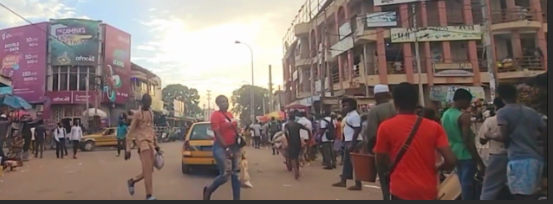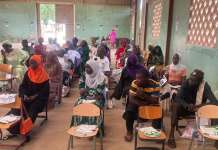By Amadou Manjang
What used to be safe spaces for pedestrians along the bustling Westfield–Sukuta Road have become extensions of the road itself, overtaken by reckless drivers allegedly protected by corrupt police officers. As traffic congestion worsens and road conditions deteriorate, pavements once meant for foot traffic are now routinely used by commercial vehicles, particularly taxis and vans – looking to bypass long queues. The result is a daily battle for space and safety, with pedestrians forced into hazardous conditions and the law seemingly ignored.
“This pavement is no longer ours,” said Majula Touray, a regular commuter. “Every time I walk, I have to look over my shoulder—not for thieves, but for vehicles speeding from behind. We’re no longer safe, even on sidewalks.”
Eyewitnesses say this illegal practice is not an occasional occurrence but a deeply entrenched norm. From morning rush hour to evening commutes, pavements are lined with moving vehicles, honking at pedestrians to move aside. Shop verandas and even roadside drains are now alternative walkways for people trying to stay out of harm’s way.
According to multiple pedestrians and residents, the situation is being enabled by selective law enforcement and bribery. Several accounts claim that traffic officers are turning a blind eye in exchange for small payments from drivers.
“The officer stops a driver, takes their license, and within minutes the driver returns after handing over a D100 bill,” said Fatou Touray. “Everyone sees it happening. It’s an open secret.”
Ebrima Manneh, a resident of London Corner, described the situation as “a disgrace and a failure of law enforcement.” He added, “Drivers no longer respect traffic laws because they know a bribe is enough to get them off the hook. It’s a dangerous cycle.”
The Gambia’s Motor Traffic Act clearly prohibits driving on sidewalks or any part of the road not designated for motor vehicles. Section 71 of the Act empowers the police to take legal action against any person driving dangerously or improperly. However, despite the clarity of the law, enforcement appears inconsistent and largely ineffective.
“I’ve had drivers yell at me to move out of the way while I was on the pavement,” said Isatou Jallow. “When I refused, one of them revved his engine until I got scared and stepped off. Where else can we walk?”
Some drivers defend their actions, citing poor road conditions and unbearable traffic. “We’re not proud of it, but the potholes and delays make it hard to work,” said a taxi driver who had just used the pavement as a shortcut. “If the roads were better, this wouldn’t happen.” Others admit they rely on the weakness of enforcement. “You get caught, you pay something small, and move on,” another driver shrugged. “It’s not a big deal.”
But for citizens like Amadou Bah, the problem is far deeper than road conditions. “The issue is not just about infrastructure—it’s about accountability,” he said. “Yes, fix the roads. But also, apply the law fairly and firmly. Right now, it’s like anything goes.”
Citizens are now calling on the Inspector General of Police and the Ministry of Transport to urgently investigate the allegations of bribery and negligence and to establish clear enforcement mechanisms that protect pedestrian rights.
Cadet Assistant Superintendent Modou Musa Sowe, speaking to Foroyaa, affirmed that all traffic police officers are expected to enforce the law without fear or favor. He condemned the misuse of pavements and warned against offering and accepting bribes.
“No driver who loves the country should have the urge or mindset to give any police officer money,” he said. “The pavements are not constructed for vehicles. There are water channels and structures beneath them. Driving on them is not only illegal but dangerous to both people and infrastructure.”
Sowe stressed that national values and civic responsibility must guide behavior on the roads. “This issue is not just about police—it’s about us as Gambians. We must love our country enough to respect our roads and protect our pedestrians,” he said.
He called for stronger enforcement and accountability, adding, “If someone is perpetually offending, we need to set examples so that it stops. The law must be enforced.”
As The Gambia’s urban areas continue to grow and traffic pressure intensifies, the safety of pedestrians remains an urgent concern. Without decisive action, citizens warn that pavements will cease to be public walkways and become permanent extensions of a broken road system—endangering lives and eroding public trust in law enforcement.




















